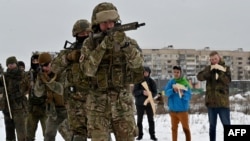The Russia-orchestrated crisis at the Ukrainian border has made one thing clear: “At its core, it’s about Russia’s rejection of a post-Cold War Europe that is whole, free, and at peace,” said Secretary of State Antony Blinken in a recent speech in Berlin, Germany.
Time after time, Russia has violated treaties and agreements to which it is a signatory, principles that have kept the peace for decades.
“Those principles,” said Secretary Blinken, “reject the right of one country to change the borders of another by force; to dictate to another the policies it pursues or the choices it makes, including with whom to associate; or to exert a sphere of influence that would subjugate sovereign neighbors to its will.
“To allow Russia to violate those principles with impunity would drag us all back to a much more dangerous and unstable time, when this continent and this city were divided in two, separated by no man’s lands, patrolled by soldiers, with the threat of all-out war hanging over everyone’s heads.”
Russia signed the 1975 Helsinki Final Act, which established 10 guiding principles ensuring the sovereignty of independent countries. Russia has violated every one of those principles.
Russia remains obligated to the Vienna Document, a politically-binding agreement intended to increase transparency and predictability about military activities, including military exercises. Russia selectively follows those provisions.
In signing the Budapest Memorandum, Russia, the United States, and the United Kingdom committed to “respect the independence and sovereignty and the existing borders of Ukraine and to refrain from the threat or use of force against” the country. Quite obviously, Russia has chosen to ignore this agreement.
“If Russia invades and occupies Ukraine, what’s next?” asks Secretary Blinken.
“Russia’s efforts to turn its neighbors into puppet states, to control their activities, to crack down on any spark of democratic expression will intensify. Once the principles of sovereignty and self-determination are thrown out, you revert to a world in which the rules we shaped together over decades erode and then vanish.”
“One country has repeatedly gone back on its commitments and ignored the very rules it agreed to despite others working hard to bring it along at every step. That country is Russia,” said Secretary Blinken. This is “bigger than a conflict between two countries. It’s bigger than Russia and NATO. It’s a crisis with global consequences, and it requires global attention and action.”
Russia's Disdain for International Norms

Time after time, Russia has violated treaties and agreements to which it is a signatory, principles that have kept the peace for decades.













